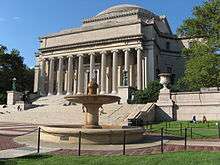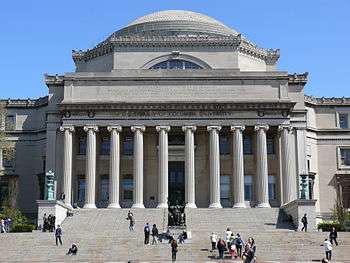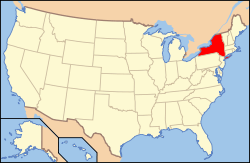Union Theological Seminary (New York City)
Union Theological Seminary in the City of New York (UTS) is a non-denominational Christian seminary[3] in New York City. It is affiliated with neighboring Columbia University. Since 1928, the seminary has served as Columbia's constituent faculty of theology. In 1964, UTS also established an affiliation with the neighboring Jewish Theological Seminary of America.
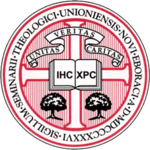 Seal of Union Theological Seminary in the City of New York | |
| Latin: Seminarium Theologicum Unioniense Novi Eboraci | |
| Motto | Unitas, Veritas, Caritas (Latin) |
|---|---|
Motto in English | Unity, Truth, Love |
| Type | Private |
| Established | 1836 |
| Endowment | US$108 million |
| President | Serene Jones |
Academic staff | 38 |
| Students | 210 |
| Location | , , United States |
| Affiliations | Columbia University |
| Website | utsnyc |
Union Theological Seminary | |
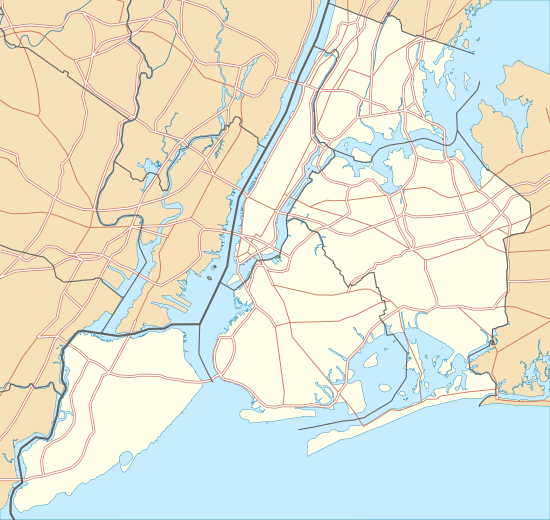   | |
| Location | W. 120th St. and Broadway, New York, NY 10027 |
| Coordinates | 40°48′41″N 73°57′51″W |
| Area | 2.3 acres (0.93 ha) |
| Built | 1908 |
| Architect | Allen & Collens |
| Architectural style | Late Gothic Revival, Collegiate Gothic, Other |
| NRHP reference No. | 80002725[2] |
| NYCL No. | 0595[1] |
| Significant dates | |
| Added to NRHP | April 23, 1980 |
| Designated NYCL | November 15, 1967 (Brown Memorial Tower, James Tower, James Memorial Chapel) |
UTS is the oldest independent seminary in the United States and has long been known as a bastion of progressive Christian scholarship, with a number of prominent thinkers among its faculty or alumni. It was founded in 1836 by members of the Presbyterian Church in the USA,[4] but was open to students of all denominations. In 1893, UTS rescinded the right of the General Assembly of the Presbyterian Church to veto faculty appointments, thus becoming fully independent. In the 20th century, Union became a center of liberal Christianity. It served as the birthplace of the Black theology, womanist theology, and other theological movements. It houses the Burke Library at Union Theological Seminary, one of the largest theological libraries in the Western Hemisphere.[5]
History
Early history
_(14587163619).jpg)
Union Theological Seminary (UTS) was founded in 1836. During the late 19th century it became one of the leading centers of liberal Christianity in the United States. In 1891, Charles A. Briggs, who was being installed as the chair of biblical studies, delivered an inaugural address in which he questioned the verbal inspiration of Scripture.[7] When the General Assembly of the Presbyterian Church in the U.S.A. vetoed Briggs' appointment and eventually deposed Briggs for heresy two years later, Union removed itself from denominational oversight.[8] In 1939 the Auburn Theological Seminary moved to its campus and departed in 2014.[9]
Among its graduates were the historian of Christianity Arthur McGiffert; biblical scholar James Moffatt; Harry Emerson Fosdick, the pastor of Riverside Church who served as professor during his tenure there; and the Socialist leader Norman Thomas.
Union Settlement
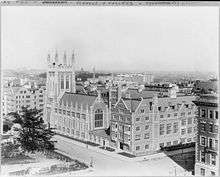
In 1895, members of the Union Theological Seminary Alumni Club founded Union Settlement Association, one of the oldest settlement houses in New York City. After visiting Toynbee Hall in London and inspired by the example of Hull House in Chicago, the alumni decided to create a settlement house in the area of Manhattan enclosed on the north and south by East 96th and 110th Streets and on the east and west by the East River and Central Park.
The neighborhood, known as East Harlem, was filled with new tenements but devoid of any civic services. The ethos of the settlement house movement called for its workers to "settle" in such neighborhoods in order to learn first-hand the problems of the residents. “It seemed to us that, as early settlers, we had a chance to grow up with the community and affect its development,” wrote William Adams Brown, Theology Professor, Union Theological Society (1892–1930) and President, Union Settlement Association (1915–1919).[10]
Union Settlement still exists, providing community-based services and programs to support the immigrant and low-income residents of East Harlem. One of East Harlem's largest social service agencies, Union Settlement reaches more than 13,000 people annually at 17 locations throughout East Harlem through a range of programs, including early childhood education, youth development, senior services, job training, the arts, adult education, nutrition, counseling, a farmers' market, community development, and neighborhood cultural events.
20th century to present
Reinhold Niebuhr and Paul Tillich made UTS the center of both liberal and neo-orthodox Protestantism in the post-War period. Prominent public intellectual Cornel West commenced a promising academic career at UTS in 1977. As liberalism lost ground to conservatism after the 1960s (while neo-orthodoxy dissipated) and thus declined in prestige, UTS ran into financial difficulties and shrank significantly because of a reduced student base.
Eventually, the school agreed to lease some of its buildings to Columbia University and to transfer ownership of and responsibility for the Burke Library to Columbia. These agreements helped stabilize the school's finances, which had been hobbled by increasing library costs and the need for substantial campus repairs.
On July 1, 2008, feminist theologian Serene Jones became Union's first female president in its 172-year history, succeeding Joseph C. Hough, Jr.[11]
On June 10, 2014, Jones announced that the Seminary would be joining the movement to divest from the fossil fuels industry in protest at the damage the industry is causing to the environment.[12] The Seminary's $108 million endowment will no longer include any fossil fuel investments.
Although administratively independent from Columbia, Union is represented by one voting faculty member, and one non-voting student observer member, of the Columbia University Senate.[13]
Campus
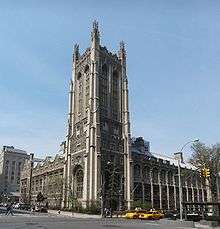
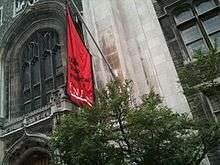
Union's campus is located in the Morningside Heights neighborhood of Manhattan, New York City, bordered by Claremont Avenue, Broadway, and West 120th and 122nd Streets. The brick and limestone English Gothic revival architecture, by architects Allen & Collens, completed in 1910, includes the tower, which adapts features of the crossing tower of Durham Cathedral. Adjacent to Teachers College, Barnard College, the Jewish Theological Seminary of America, and the Manhattan School of Music, Union has cross-registration and library access agreements with all of these schools.
The building was added to the National Register of Historic Places on April 23, 1980, and parts were made a New York City designated landmark in 1965.[1] Some sections of the campus are now on long-term lease to Columbia University.
Library
The Burke Library at Union Theological Seminary, one of the largest theological libraries in North America, contains holdings of over 700,000 items. The Burke's holdings include extensive special collections, including Greek census records from 20 CE, a rare 12th Century manuscript of the Life of St. Boniface, and one of the first African-American hymnals, published in Philadelphia in 1818.
The Burke Library also maintains a number of world-renowned archival collections, including the Archives of Women in Theological Scholarship and the Missionary Research Library Archives.
In 2004 Union's Burke Library became fully integrated into the Columbia University Libraries system, which holds over 10 million volumes. The library is named in honor of Walter Burke, a generous benefactor to the library who served as Chairman of the Board of Directors of the Seminary from 1976 to 1982.
Faculty
In 1930, Dietrich Bonhoeffer was a Postgraduate Teaching Fellow at the seminary. He later returned in 1939 to be a member of the faculty and to escape Nazi harassment in Germany. Writing of his experience there in his book Barcelona, Berlin, New York, Bonhoeffer was dismayed by the liberalism of the seminary and its students, noting that, "The students are completely clueless with respect to what dogmatics is really about. They are not familiar with even the most basic questions. They become intoxicated with liberal and humanistic phrases, are amused at the fundamentalists, and yet basically are not even up to their level...." Referring to Union Seminary, Bonhoeffer noted: "A seminary in which numerous students openly laugh during a public lecture because they find it amusing when a passage on sin and forgiveness ...is cited has obviously, despite its many advantages, forgotten what Christian theology in its very essence stands for" (pp. 309–10). He soon regretted his decision and decided that he had to return to Germany to resist the Nazis. He took the last ship from New York to Germany in late August 1939. Due to his secret involvement with the 20 July plot on Hitler's life, he was executed at the Flossenbürg concentration camp on April 8, 1945, only 15 days before the United States Army liberated the camp.
Both Reinhold Niebuhr and Paul Tillich taught at the seminary during the post-World War II period.
Dr. Serene Jones, the seminary's first female president, was inaugurated in November 2008. Dr. Joseph Hough, UTS' immediate past president, is a Christian Democratic Socialist. Henry Sloane Coffin was a past president. Civil Rights Activist Cornel West joined the faculty in July 2012. Dr. James Hal Cone is one of the founders of liberation theology and is active in the development of African-American theology.
Union has also been home to Womanist theologians such as Delores S. Williams. Dr. Gary Dorrien is a social ethicist. Dr. James A. Forbes, the former senior pastor of the adjacent Riverside Church, is an adjunct professor at the seminary and had been a full-time, chaired professor before accepting the Riverside post.
Notable current faculty
- Mary C. Boys – Skinner and McAlpin Professor of Practical Theology
- David M. Carr – Professor of Old Testament; contributed to Genesis in the New Oxford Annotated Bible (New Revised Standard Version)
- Chung Hyun Kyung – Associate Professor of Ecumenical Theology
- Michelle Alexander – writer, civil rights advocate, author of The New Jim Crow: Mass Incarceration in the Age of Colorblindness, opinion columnist for The New York Times
Several of Union's members also teach in the Religious Studies department at Columbia University, the Teachers College, Columbia University, New York Theological Seminary, and the Jewish Theological Seminary of America.
Notable former faculty
- John Anthony McGuckin – Nielsen Professor of Early and Byzantine Church History, President of the Sophia Institute, Archpriest of the Orthodox Church
- Charles Butler (1802–97) – founder
- Philip Schaff (1819–1893) – Theologian and ecclesiastical historian who served as chair of theological encyclopedia and Christian symbolism, then as chair of Hebrew and the cognate languages, followed by chair of sacred literature, and finally chair of church history until his death in 1893.
- William Greenough Thayer Shedd — Professor of Sacred Literature (1863–1874) and of Systematic Theology (1874–1890)
- Charles Augustus Briggs – Professor of Hebrew and Cognate Languages (1874–1891) and of Biblical Theology (1891–1904); an important early leader of the Modernist movement
- Reinhold Niebuhr (1892–1971) – Professor of Applied Christianity – Christian social ethics, author of the influential The Nature and Destiny of Man (1941), and the Serenity Prayer (popularized through the Twelve-step program)
- Paul Tillich (1886–1965) – German-American theologian and Christian existentialist philosopher
- John Macquarrie – Professor of Systematic Theology (1962–70), afterwards Lady Margaret Professor of Divinity in the University of Oxford and Canon Residentiary of Christ Church, Oxford (1970–1986)
- James Cone (1936-2018) – a founder of Black theology, he was Charles Augustus Briggs Distinguished Professor of Systematic Theology until his death
- Beverly Wildung Harrison - a Christian feminist ethicist, she taught for 34 years at Union, and was the Caroline Williams Beaird Professor of Ethics. She was the first woman president of the North American Society of Christian Ethics.
- Robert Pollack – professor of Science and Religion
- Raymond E. Brown (1928–1998) – Professor of New Testament (1971-1990), member of the Pontifical Bible Commission, and the first Catholic to gain tenure[14]
- Edward Robinson – Biblical scholar and discoverer of Robinson's Arch and Hezekiah's Tunnel in Jerusalem
- Henry Sloane Coffin – President of Union and a leading theological liberal. Coffin also obtained his Bachelor of Divinity from the Union Theological Seminary in 1900. He declined an offer to become president of Union Theological Seminary in 1916. In 1926, offered the presidency (a second time), he accepted and retained the post until 1945.
- Dorothee Soelle – Socially engaged German theologian
- Harry Emerson Fosdick – First minister of Riverside Church and professor of homiletics
- Harry F. Ward – chairman of the ACLU and Professor of Ethics
- Walter Wink – Biblical scholar and activist
- Roger Haight – theologian banned from teaching by the Holy Office[15]
- Harrison S. Elliot (1882–1951) – author and leader in the Y.M.C.A., Religious Education Association, and Union Theological Seminary.
- J. Brooke Mosley, president
- W. D. Davies, (1911–2001), Welsh-born Edward Robinson Professor of Biblical Theology, noted New Testament scholar and Congregationalist Minister.
- Ann Belford Ulanov – Christiane Brooks Johnson Memorial Professor of Psychiatry and Religion
- Cornel West – Professor of Religious Philosophy and Christian Practice
- Christopher Morse – Dietrich Bonhoeffer Professor of Theology & Ethics
- Paul F. Knitter – Paul Tillich Professor of Theology
- Peter C. Phan – the inaugural holder of the Ellacuria Chair of Catholic Social Thought at Georgetown University[16]
Notable alumni
- Rubem Alves – Brazilian theologian and writer
- William Scott Ament (Bachelor of Divinity, 1877) – controversial American missionary to China (1877–1909)
- John Batchelor – American radio news show writer and host
- Frederic Mayer Bird – Class of 1860: clergyman, educator, and hymnologist.
- J. Seelye Bixler – 16th president of Colby College
- Dietrich Bonhoeffer – German Lutheran theologian and Nazi resister who spent half a year at UTS. Of UTS he wrote: "There is no theology here....they (the students) talk a blue streak without the slightest substantive foundation and with no evidence of any criteria. The students....are completely clueless with respect to what dogmatics is really about. They are unfamiliar with even the most basic questions. They become intoxicated with liberal and humanistic phrases, laugh at the fundamentalists, and yet basically are not even up to their level."[17]
- Anton Boisen – founder of Clinical Pastoral Education (CPE) movement
- Marcus Borg – Biblical scholar and author; former Hundere Distinguished Professor of Religion and Culture at Oregon State University
- Malcolm Boyd – Episcopal priest and author. He was one of the most prominent of the gay clergy to come out of the closet when he did so in 1977. For two years in 1956 and 1957, Boyd engaged in post-graduate studies at Union Theological Seminary where he wrote his first book, Crisis in Communication. He participated in the civil rights and anti-Vietnam War movements in the 1960s.
- Frederick Buechner – an American writer, novelist, poet, essayist, theologian, and ordained Presbyterian minister. Buechner described his time at Union at length in his 1982 autobiographical work, The Sacred Journey. In 2008 Union honored Buechner with the Unitas Distinguished Alumni/ae Awards, bestowed upon alumni/ae who exemplify the Seminary’s academic breadth, diversity, and inclusiveness.[18]
- Frederick Buckley Newell (Bachelor of Divinity, 1916) – Bishop of The Methodist Church
- Edwin Otway Burnham (Bachelor of Divinity, 1855) – a rifle shooting Congregational missionary in Sioux Indian territory who could bark a squirrel, swing an axe or dispense Gospel with equal fervor and efficiency.
- David Budbill – poet
- Walter Brueggemann – William Marcellus McPheeters professor of Old Testament at Columbia Theological Seminary
- Gladwyn M. Childs – anthropologist and missionary
- Grigor Cilka – reverend, missionary, teacher and founder of first Protestant parish in Korçë, Albania
- Nelson Cruikshank (Master of divinity, 1929) – labor union activist and strategist responsible for the passage of Medicare
- David Dellinger – noted American peace activist and member of the Chicago Seven
- Lynn de Silva (Master of Sacred Theology) – Sri Lankan theologian, former director of the Ecumenical Institute for Study and Dialogue, Methodist minister, and a pioneer in promoting Buddhist–Christian dialogue
- John R. Everett (BD 1944) - President of Hollins College, first Chancellor of the Municipal College System of the City of New York, and President of the New School for Social Research
- Helen Flanders Dunbar (B.D. 1927) – an important early figure in U.S. psychosomatic medicine
- Franklin I. Gamwell – Shailer Mathews Professor of Religious Ethics, the Philosophy of Religion, and Theology at the Divinity School of the University of Chicago
- Francis L. Garrett – Chief of Chaplains of the U.S. Navy
- Beverly Roberts Gaventa – New Testament exegete, theologian, and author most recently of When in Romans[19]
- Susan E. Goff, suffragan bishop of the Episcopal Diocese of Virginia
- David P. Gushee – Distinguished University Professor of Christian Ethics at Mercer University. Author of 9 books and over 70 articles[20]
- Douglas John Hall – emeritus professor of theology at McGill University, and theologian of the cross.
- Mark Hanson – former Presiding Bishop of the Evangelical Lutheran Church in America.
- Carter Heyward – lesbian feminist theologian and priest in the Episcopal Church
- Richard Holloway – Scottish writer and broadcaster and was formerly Bishop of Edinburgh
- Dwight Hopkins – Professor of Theology at the Divinity School at the University of Chicago
- Myles Horton – co-founder of the Highlander Center
- William H. Hudnut III – former Mayor of Indianapolis, Indiana (1976–1992)
- Ada Maria Isasi-Diaz – Professor of Ethics and Theology at Drew University
- Suzan Johnson Cook – former presidential advisor and United States Ambassador-at-Large for International Religious Freedom (2011–2013)
- Mark Juergensmeyer – Professor of Sociology, Religious Studies, and Global Studies at the University of California at Santa Barbara and Director of the Orfalea Center for Global and International Studies
- Norman J. Kansfield – President New Brunswick Theological Seminary 1993–2005 and Senior Scholar in Residence, Theological School, Drew University
- Mineo Katagiri – Minister and social activist
- James Franklin Kay – Professor of Homiletics and Liturgics at Princeton Theological Seminary
- George R. Lunn – Mayor of Schenectady, New York, Member of the United States House of Representatives, Lieutenant Governor of New York
- Ernest Lyon (1860-1938) – Minister, former United States Ambassador to Liberia, and founder of the Maryland Industrial and Agricultural Institute for Colored Youths.
- Reuben H. Markham – missionary educator to Bulgaria; journalist, Christian Science Monitor; author of numerous books
- Rollo May – Existential psychologist
- Rachel Kollock McDowell – religion editor of the New York Times (1920–1948)
- Andrew McLellan – former Moderator of the General Assembly of the Church of Scotland
- James David Manning – pastor in Harlem
- Bruce McLeod (PhD) – Moderator of the United Church of Canada
- William P. Merrill – first president on the Church Peace Union, writer of "Rise Up, O Men of God"
- Henry F. C. Nichols – member of the Wisconsin State Assembly
- Paul Raushenbush – American Baptist minister and Religion Editor for The Huffington Post
- John Bunyan Reeve – First black student, organized theology department at Howard University
- Scott Rennie – minister of the Church of Scotland at Queen's Cross Church, Aberdeen
- James Herman Robinson (1938) – founder of Operation Crossroads Africa, a forerunner of the Peace Corps
- Carl Rogers – pioneering psychologist
- E.P. Sanders – a principal founder of the New Perspective on Paul movement
- Nathan A. Scott, Jr. – scholar of religion and literature
- Henry Sloane Coffin – President of Union Theological Seminary
- Andrea Smith – Indigenous intellectual and anti-violence activist
- John Sung – a Chinese Christian evangelist who played an instrumental role in the revival movement among the Chinese in Mainland China, Taiwan, and Southeast Asia during the 1920s and 1930s
- John Stoltenberg – feminist writer
- Juhanon Mar Thoma – Metropolitan of Marthoma Syrian Church in India
- Norman Thomas – American socialist
- K. H. Ting – President emeritus of the Three-Self Patriotic Movement and China Christian Council
- Raphael Warnock – pastor at Ebenezer Baptist Church in Atlanta[21]
- George W. Webber (1920–2010) – President of the New York Theological Seminary[22]
- Floyd Wilcox – third president of Shimer College
- Walter Wink – Biblical scholar and activist
See also
References
- "Union Theological Seminary" (PDF). New York City Landmarks Preservation Commission. November 15, 1967. Retrieved December 23, 2019.
- "National Register Information System". National Register of Historic Places. National Park Service. July 9, 2010.
- "Mission & Vision". Union Theological Seminary. Retrieved March 15, 2019.
- Union Theological Seminary – Timeline, 1836 to 1869
- http://library.columbia.edu/locations/burke.html
- A History of Real Estate, Building and Architecture in New York City During the Last Quarter of a Century. New York City: Record and Guide. 1898. pp. 371.
- Hart, D. G.; Muether, John (2007). Seeking a Better Country: 300 Years of American Presbyterianism. Phillipsburg, N.J.: Presbyterian & Reformed Publishing. p. 183. ISBN 9780875525747. OCLC 122974080.
- Hart & Muether, pg. 183
- "About Us". Auburn Theological Seminary web site. Archived from the original on February 21, 2010. Retrieved January 21, 2010.
- A Teacher and His Times, William Adams Brown, Scribner, 1940.
- Union Theological Seminary – Serene Jones, President of the Faculty
- "WeAreClimateChange". Archived from the original on March 3, 2016. Retrieved December 18, 2016.
- A Guide to the University Senate, University Senate Office, Columbia University (February 2019).
- Niebuhr, Gustav (August 11, 1998). "Raymond E. Brown, 70, Dies; A Leading Biblical Scholar". The New York Times. ISSN 0362-4331. Retrieved March 5, 2017.
- "The Vatican levies further penalties on Roger Haight, SJ - Commonweal Magazine". Retrieved December 18, 2016.
- "Peter Phan". berkleycenter.georgetown.edu. Retrieved November 20, 2017.
- Metaxas, Eric| Bonhoeffer: Pastor, Martyr, Prophet, Spy 2010, Thomas Nelson Publishers, p. 101
- "Unitas Awards: Union Theological Seminary". Union Theological Seminary New York.
- Beverly Roberts Gaventa, When in Romans: An Invitation to Linger with the Gospel According to Paul, Grand Rapids: Baker Press. Description. Forthcoming, November 15, 2016.
- "Home". Retrieved December 18, 2016.
- "Who Is Raphael Warnock?: Everything To Know About Ebenezer Baptist Pastor Running For Georgia Senate". News One. Retrieved February 1, 2020.
- Martin, Douglas. "George W. Webber, Social Activist Minister, Dies at 90", The New York Times, July 12, 2010. Accessed July 13, 2010.
Bibliography
- Handy, Robert T. A History of Union Theological Seminary in New York. New York: Columbia University Press, 1987.
External links
| Wikimedia Commons has media related to Union Theological Seminary (New York City). |
